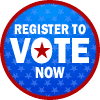Last week, nearly 2000 people from across the country convened at the Netroots Nation conference in Philadelphia. Unfortunately, Declare Yourself couldn't be there... but Sarah Burris, of Future Majority, attended the voter registration panel and wrote about her experience. Check it out:
One of the panels I attended at Netroots Nation was Repairing our Democracy: Voter Registration Modernization and other Solutions with speakers Secretary Debra Bowen California's Secretary of State, Dean Logan the Registrar-Recorder/County Clerk for Los Angeles County (the nation’s largest county), Jonah Goldman a national expert on voting and elections, and Justin Levitt counsel at the Brennan Center for Justice. The panel was also moderated by Eric Marshall, campaign manager for the National Campaign for Fair Elections in the Lawyers' Committee for Civil Rights Under Law's Voting Rights Project.
Highly knowledgeable experts on the panel seemed to develop the consensus that the system is broken.
"We must have a system of error correction that is speedy enough so that people aren't disenfranchised and the error is corrected," Secretary Bowen said. "We need more consistent rules of residency for students. Some places are down right hostile about allowing students to vote, some are welcoming, but many are very hard on students."
"There are huge barriers to over seas voters and our military. When I visited Iraq and Afghanistan I met with the voting official who is not elected but appointed to do the job. . ."
Bowen continued to describe an over 500 page manual that the military official must be familiar with because there are so many voting laws for each state he must know.
"If we're disenfranchising people who are serving us it's time for the states to voluntarily figure out one cohesive consistent way that it works."
LA County Clerk Dean Logan told a story about a meeting he had with other election officials where it was asked if they could redesign the entire voter registration from if anyone would keep the original... none would.
Logan said they had 500,000 newly registered voters, and on the 15 day cut off for voter registration deadline California Counties had a Midnight Madness for people who had up to the last minute to register to vote.
"We had people coming in in their pajamas and it was packed! But the day after that cut off, we received 64,000 forms by people who missed the deadline. The next day 100,000 people sent in forms. We failed them administratively," he admitted.
But, Mr. Goldman said that new technologies provide a "non-partisan solution to a non-partisan problem that we can all work to fix."
Mr. Logan agreed believing
"despite this archaic system we are using technology better, allowing people to verify their information. But if you're online and realize that you need to change your address or you need to correct it, then that's where it stops, there is no way to update that."
The panel agreed the system breakdown is targeted at registration itself. Everything that happens on the back end is relatively smooth, even Logan said that when it comes to provisional ballots 80-90% of them count and can be verified, but the breakdown happened in the registration process somewhere.
Secretary Bowen said the argument against a massive reorganization and standardization effort would be the constant "states rights" argument. But Bowen believes that registration difficulties that occur in places like Florida and Ohio do affect California in a substantial way. Everything from Universal Registration to Election Day Registration are all options on the table but neither are being considered at the federal level.
The Military and Overseas Voters Empowerment Act (“MOVE Act”) authored by Senator Chuck Shumer was approved by the US Senate
"after a Rules Committee survey last May showed that as many as one in four ballots cast by military voters went uncounted in last year’s presidential election," Shumer's office said.
Among other things, "the bill would require states to provide ballots electronically. Additionally, it beefs up the Federal Voting Assistance Program (FVAP) at the Department of Defense, which is the main source of election-related information and assistance for many members of the military. The legislation, S. 1415, also addresses problems the military and overseas voters face in registering to vote from outside the U.S. It would bar states from rejecting military ballots for lack of a “Notary” signature—a feat difficult to achieve in the bases of Iraq and Afghanistan."
The Student VOTER Act was also re-introduced this session back in March. Late July will also bring the second hearing for the Student VOTER Act in the Committee on House Administration and will hopefully go into mark-up in September when it should also be in line for a floor vote.
Matthew Segal from the Student Association for Voter Empowerment told me via email that Majority Leader Steney Hoyer has been extremely supportive so he's optimistic we can get the bill on the floor this year. If you missed it, former US Senate Leader Tom Daschle has been a fantastic public advocate on the Student VOTER Act, and Zoe Lofgren, who chairs the subcommittee on elections within the Committee on House administration has also now signed onto the bill, as has Susan Davis, who is another member of both the full committee and subcommittee.
Segal says
"their leadership will assist us in getting the bill marked up this September. We [also] hope that other youth organizations will join us in making this one of their principal legislative priorities for 2009 and 2010."
As Bowen said, issues like Voting Rights aren't as sexy as issues like Health Care, but the ability to register to vote, be able to vote, and have that vote counted as its cast is the foundation of our democracy. We should be able to count on all of those things.
Read the original text of the article HERE.





0 comments:
Post a Comment